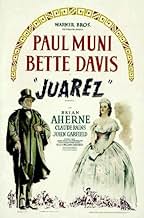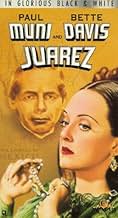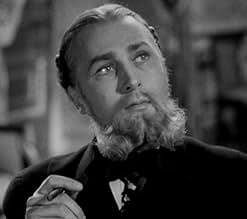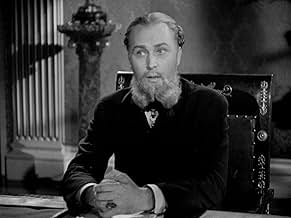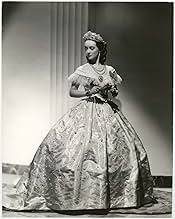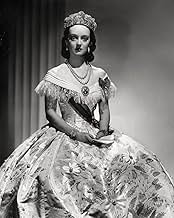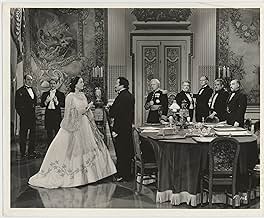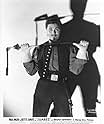Adicionar um enredo no seu idiomaLouis Napoleon III (Claude Rains) takes advantage of the American Civil War to circumvent the Monroe Doctrine and expand his power by helping Emperor Maximilian von Habsburg (Brian Aherne) t... Ler tudoLouis Napoleon III (Claude Rains) takes advantage of the American Civil War to circumvent the Monroe Doctrine and expand his power by helping Emperor Maximilian von Habsburg (Brian Aherne) to add Mexico to his empire.Louis Napoleon III (Claude Rains) takes advantage of the American Civil War to circumvent the Monroe Doctrine and expand his power by helping Emperor Maximilian von Habsburg (Brian Aherne) to add Mexico to his empire.
- Direção
- Roteiristas
- Artistas
- Indicado a 1 Oscar
- 3 vitórias e 1 indicação no total
Avaliações em destaque
The film is historically correct and that is part of the problem. The filmmakers put every incident that led to the fall of Maximillian into the story and the film drags on and on. It's more information that we need to know.
There are mixed opinions on the Bette Davis portrayal of Empress Carlotta, the unstable wife of Maximillian. Hers is an interesting story but Davis may not have put enough incipient madness into her characterization.
On the whole,this is a pretty good history lesson with no Hollywood happy ending tacked on, that tells of a well meaning, gentle man who was badly used by the French emperor, sent to rule a people of whom he knew nothing, in a land where he was not wanted. And Aherne absolutely is perfect for the part.....he is the star of this film.
The people are represented by Paul Muni impersonating Mexican president Benito Juarez; his expressionless face and slow, monotonous line readings are almost laughable; he comes across as a sort of Unconquerable Zombie of the People. He almost always appears in the same frame as a portrait of his hero and contemporary, Abraham Lincoln. As others have pointed out, his most powerful moment comes when he walks purposefully toward a line of armed soldiers in one of those moments of truth at the core of all successful revolutions: the refusal of the armed forces to defend the established regime.
The hounded monarch, Archduke Maximilian, is played by Brian Aherne in what may well be the best casting he was ever assigned on film. His performance is letter perfect as the idealistic puppet of Napoleon III who stuck to his outmoded principles despite overwhelming odds in much the same way as Nicholas II did in Russia decades later. In another parallel to the later Russian events, his domineering wife Carlotta (played by a beautifully photographed, no-holds-barred, black-bewigged Bette Davis) takes matters into her own hands to support his flimsy but ardent claim to the leadership of the country; Aherne, like Muni, is also frequently seen in proximity to a framed portrait - of his wife.
This is an expensive production with lavish costumes, stunning set pieces, gorgeous music, literate dialogue, a who's who of excellent supporting players, and breathtaking photography (the latter by veteran cameraman Tonio Gaudio, some of whose visions, especially Carlotta's prayer to the Virgin Mary and her final scene in a sunlit chamber, recall the most ethereal imagery of the silent era). All of these elements work together to get our blood surging in sympathy for the downtrodden Mexican peasantry as they rise up against cold hearted official corruption. And on a smaller level we feel equally moved by the personal plight of Maximilian.
With so much stuffing, not everything works perfectly. John Garfield, one of the best film actors of his time, is unconvincing as a Mexican general. There is a problem with pacing and informational overkill. Muni's sleepwalking performance contributes to a sense of sluggishness. Whenever he appears you brace yourself for a plodding and profound dose of Great Truth. At least these Truths are not banalities, so they are somewhat worth waiting for.
The problem with the screenplay is that Bettina Harding bought the romantic, Euro-centric notion of Max and Carlotta as figures in a "tragic romance". They were patsies for Napoleon III's global ambitions (something the film does very well), but everyone in Mexico knows the two were complete fools who destroyed the economy, and hardly the loving couple depicted in the movie. Max was a syphilitic, pretentious twit. He neglected Carlotta (the "Casa Obvio", his summer house in Cuernavaca that he built, "forgetting" to include rooms for Carlotta is a popular tourist attraction now, and a botanical museum), had a son by his mistress, "la Bonita India" and -- infected his wife.
The other reviewer is unintentionally misleading when he writes that Carlotta lived in seclusion for 60 years. She was bed-ridden most of the time, suffering tertiary syphilis, requiring round-the-clock medical care. She did indeed, like in the film, go bonkers -- but in the Vatican, not in a French palace. The Papacy was a major player in the geo-politics surrounding the Mexican adventure, but the film (perhaps wisely) simplifies the politics.
But, what the hey -- it's Hollywood! It has the perfect cast for this kind of epic: who better to play stoic, long-suffering historical figures than Paul Muni? Who does devious Europeans better than Claude Raines and Donald Crisp? I really enjoy seeing Porfirio Diaz (who later seized the Mexican presidency in a coup, and maintained control for close to 35 years -- and is now a mixed figure in Mexican history, sort of like Lenin with the Russians, or Ataturk among the Turks) played by John Garfield. And who better to go completely bonkers and chew up the scenery than Bette Davis? By all means, watch the movie, but then read your Mexican history.
Você sabia?
- CuriosidadesBecause the film shows a number of Maximilian's generals to be Mexican, many viewers attribute it to typical Hollywood historical distortions. It is, however, indeed accurate. It's a little-known fact that, although Maximilian was eventually overthrown and executed by Mexican revolutionaries, there were more Mexicans fighting on Maximilian's side than against him. This was due in large part to the Catholic Church's strong support of the French occupation of Mexico and its encouraging of Mexican Catholics to fight against the revolutionary forces by joining Maximilian's army, which they did in large numbers.
- Erros de gravaçãoWhen Napoleon III is informed in a letter that Robert E. Lee has been defeated at Gettysburg, he responds by paraphrasing Lincoln's famous Gettysburg Address by calling democracy as government for the people, by the people, etc. He couldn't have known Lincoln's speech flourish because it wasn't given until November 19, 1863, more than four months after the battle.
- Citações
Emperor Louis Napoleon III: Democracy! Government of the cattle, by the cattle, for the cattle!
- Versões alternativasIn 1952, the film was re-released and several key scenes were removed, particularly sequences that contained dialogue that criticized countries which, in 1939 had been regarded as totalitarian, but which, by the early 1950s had become Cold War allies of the United States and could therefore no longer be criticized as imperialist adventurers. Germany and Italy, especially, former enemies in the 1940s, were now the cornerstone of NATO. The removal of these scenes obfuscated the narrative considerably, in particular, removing any clear reasons behind the execution of the Emperor Maximilian at the conclusion of the film. This revised print runs 106 minutes and is the version released on video and generally available today. The 1939 version is preserved on nitrate stock in the Warner Archive.
- ConexõesFeatured in Hollywood and the Stars: The Angry Screen (1964)
- Trilhas sonorasMy Country Tis of Thee
(uncredited)
Music attributed to Henry Carey (1744)
Played as part of the score when America is mentioned
Principais escolhas
- How long is Juarez?Fornecido pela Alexa
Detalhes
- Data de lançamento
- País de origem
- Idiomas
- Também conhecido como
- Maximilian and Carlotta
- Locações de filme
- Warner Ranch, Calabasas, Califórnia, EUA(Photographs)
- Empresa de produção
- Consulte mais créditos da empresa na IMDbPro
- Tempo de duração
- 2 h 5 min(125 min)
- Cor
- Mixagem de som
- Proporção
- 1.37 : 1


